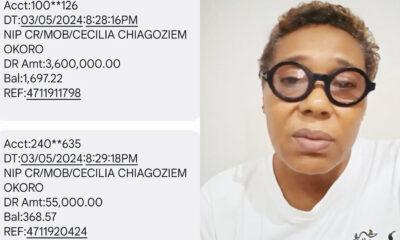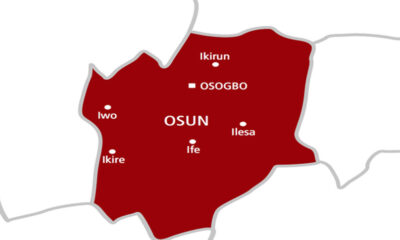Business
CBN introduces new private sector-led agric scheme

The Central Bank of Nigeria has unveiled guidelines for the operation of the Private Sector-led Accelerated Agriculture Development Scheme (P-AADS) to facilitate increased private sector agricultural production of staple foods and industrial raw materials as well as support food security, job creation and economic diversification.
The P-AADS is designed to complement the Accelerated Agriculture Development Scheme (AADS), earlier introduced by the apex bank to engage 370,000 youths in agricultural production, in collaboration with state governments as well as address the food security and youth unemployment challenges across the country.
Efforts at growing the economy also received a boost from the United Nations (UN) with the provision of $250 million for Nigeria’s Economic Sustainability Plan.
The UN offer, which is aimed at complementing Nigeria’s COVID-19 economic recovery efforts under the Nigerian Economic Sustainability Plan (ESP) initiative, was hailed by Vice President Yemi Osinbajo.
The CBN, in a circular titled: “Guidelines for the Private Sector-led Accelerated Agriculture Development Scheme,” signed by the Director, Development Finance Department, Mr. Yusuf Yila, said the scheme shall be funded from the Anchor Borrowers’ Programme (ABP).
The CBN pegged the maximum loan accessible under the scheme at N2 billion per obligor- and to be repaid from the Economics of Production (EOP) for cultivating on the cleared farmland.
The apex bank also stated that interest rate under the intervention shall be five per cent per annum (all-inclusive) up to February 28, 2021.
However, interest on the facility from March 1, 2021, shall be nine per cent per annum (all-inclusive), it added.
The guidelines put the maximum tenor for annual crops at six years with a six months’ moratorium while perennial crops have a maximum tenor of 10 years with a one-year moratorium.
The framework also stipulated that the collateral be pledged by participants under the scheme shall be the title of the cleared land and other acceptable collateral prescribed under the ABP.
The CBN added that it will bear 50 per cent of the credit risk in the event of default by the participants while the repayment of the facility shall be made on instalment through the participating banks and spread over the EOP of the cultivated commodities.
The participating banks shall remit repayments received to the CBN on a quarterly or annual basis depending on the commodity financed.
The CBN listed the focal agricultural commodities eligible for consideration under the scheme to include rice, maize, cassava, cotton, wheat, tomato and poultry.
Others include fish, sorghum, oil palm, cocoa, livestock/dairy and any other commodities as may be listed by the CBN from time to time.
On the eligibility criteria, the apex bank stated that prospective P-AADS participants must be existing or new firms engaged in agricultural production with proven capacity and bankable proposal; possess the acceptable title for contiguous lands of not less than 20 hectares; have good credit record and be able to provide collateral for participation.
The beneficiary will also provide evidence of the capacity to cultivate a focal commodity directly or engagement of farmers, including youths as in-growers or out-growers to cultivate on the land after clearing.
The guidelines specified infractions and sanctions against participating parties.
According to the CBN, diversion of funds by the participating banks shall attract a penalty at its maximum lending rate at the time of the infraction.
In addition, such PFI shall be barred from further participation under the scheme.
Also, non-rendition or false returns shall attract the penalty stipulated by BOFIA, while charging interest rate higher than prescribed shall attract the penalty stipulated by BOFIA.
The CBN said any participating bank that fails to disburse the fund within the stipulated days of receipt to the borrower shall be charged penalty interest at the PFI’s maximum lending rate for the period the fund was not disbursed.
Also, failure to remit repayments received to CBN within the stipulated period shall attract penalty interest at the PFIs maximum lending rate.
Business
Finally, NERC unbundles TCN, creates new system operator

Finally, NERC unbundles TCN, creates new system operator
The Nigerian Electricity Regulatory Commission (NERC) has set up the Nigerian Independent System Operator of Nigeria Limited (NISO) as it unbundles the Transmission Company of Nigeria (TCN).
The transmission leg of the power sector has over the years been seen as weakest link with obsolete equipment.
The unbundling announcement is contained in an Order dated April 30, 2023 and jointly signed by NERC chairman, Sanusi Garba, and vice chairman, Musiliu Oseni.
By this order, the TCN is expected to transfer all market and system operation functions to the new company.
The commission had previously issued transmission service provider (TSP) and system operations (SO) licences to the TCN, in accordance with the Electric Power Sector Reform Act.
The Electricity Act 2023, which came into effect on June 9, provided clearer guidelines for the incorporation and licensing of the independent system operator (ISO), as well as the transfer of assets and liabilities of TCN’s portion of the ISO.
In the circular, the commission ordered the Bureau of Public Enterprises (BPE) to incorporate, unfailingly on May 31, a private company limited by shares under the Companies and Allied Matters Act (CAMA), 2020.
NERC said the company is expected “to carry out the market and system operation functions stipulated in the Electricity Act and the terms and conditions of the system operation licence issued to the TCN.
“The name of the company shall, subject to availability at Corporate Affairs Commission, be the Nigerian Independent System Operator of Nigeria Limited (“NISO”),” NERC said.
Citing the object clause of the NISO’s memorandum of association (MOU) as provided in the Electricity Act, NERC said the company would “hold and manage all assets and liabilities pertaining to market and system operation on behalf of market participants and consumer groups or such stakeholders as the Commission may specify.”
Business
Naira depreciates again, trades at N1,402/$

Naira depreciates again, trades at N1,402/$
The Nigerian currency, naira, on Thursday slightly depreciated at the official market, trading at N1,402.67 to the dollar.
Data from the official trading platform of the FMDQ Exchange, a platform that oversees the Nigerian Autonomous Foreign Exchange Market (NAFEM), showed that the naira lost N11.71
READ ALSO:
- Why I killed my one-year-old son – Delta woman
- Bandits kill nine civilian JTF members, kidnap three in Sokoto
- Yahaya Bello govt spending third term in office through Ododo – Clark
This represents a 0.84 per cent loss when compared to the previous trading date on Tuesday April 30, when it exchanged at 1,390.96 to a dollar.
However, the total daily turnover increased to 232.84 million dollars on Thursday, up from 225.36 million dollars recorded on Tuesday.
Meanwhile, at the Investor’s and Exporter’s (I&E) window, the naira traded between 1,445.00 and N1,299.42 against the dollar.
Naira depreciates again, trades at N1,402/$
Auto
Appeal court takes over NURTW case as NIC withdraws

Appeal court takes over NURTW case as NIC withdraws
The National Industrial Court has withdrawn from a case involving Alhaji Najeem Usman Yasin, Board of Trustees chairman of the National Union of Road Transport Workers (NURTW), and Alhaji Tajudeen Ibikunle Baruwa’s ambition to return as president of the union over lack of jurisdiction.
The industrial court’s decision was made to avoid conflict with the Court of Appeal, where the matter is already being heard.
Before the NIC announced its decision to hands-off the case, the defendants’ counsel, Mr. O.I. Olorundare SAN, had informed the court that the matter is currently before the Court of Appeal, Abuja division, and that the industrial court could not continue to adjudicate on the same matter.
The counsel cited authorities to support his claim, adding that the National Industrial Court does not have concurrent jurisdiction with the Court of Appeal.
The presiding judge, O.O. Oyewunmi, struck out the case, stating that the Appeal Court had taken over the matter and that the Industrial Court must respect the hierarchy of courts.
Alhaji Yasin and six others took the case to the Appeal Court, challenging the decision of the industrial court recognising a delegates’ conference held on May 24, 2023, where Baruwa was proclaimed as President of the union for a second term in office.
With the latest NIC judgement, both parties will now proceed to defend their positions at the Court of Appeal and await the final judgement.
-

 International3 days ago
International3 days agoUS students slam Biden’s comments on Gaza encampments
-

 Entertainment12 hours ago
Entertainment12 hours agoNollywood veteran Shan George weeps as fraudster clears ₦3.6m from her account (VIDEO)
-

 News3 days ago
News3 days agoGroup protests alleged imposition of Imam in Osun
-

 Sports14 hours ago
Sports14 hours agoRonaldo’s hat-trick leads Al Nassr to 6-0 victory over Al Wehda
-

 News2 days ago
News2 days agoDon’t host US, French military bases in Nigeria, northern leaders warn Tinubu
-

 International13 hours ago
International13 hours agoGaza: Thousands rally for hostage deal as ceasefire talks continue
-

 News3 days ago
News3 days agoLagos GDP hits N41tn, earns N433bn from IGR
-

 International3 days ago
International3 days agoDam collapses, death toll rises in Brazil floods























You must be logged in to post a comment Login